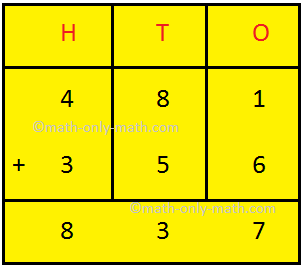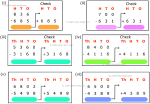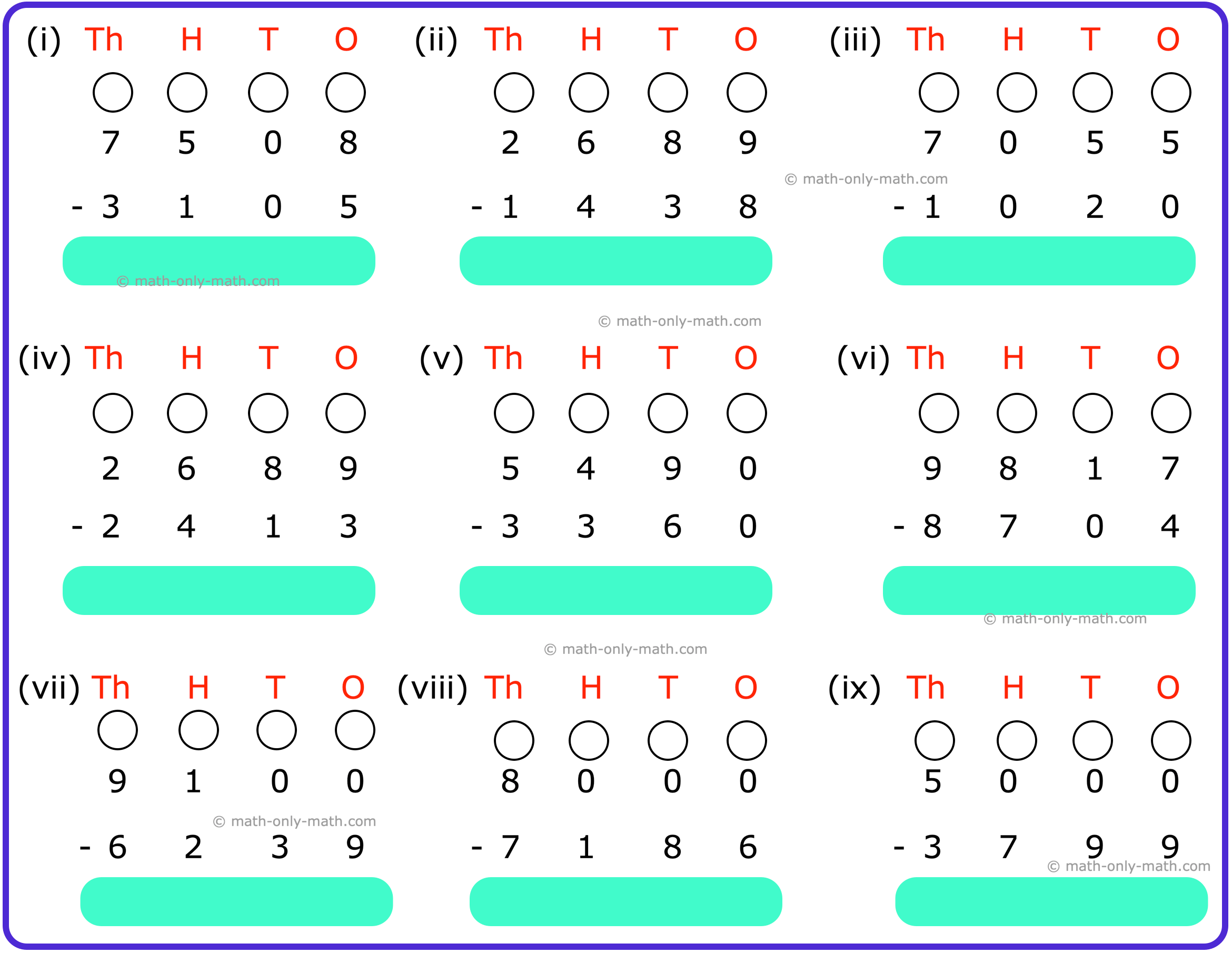Decimal as Fraction
We will discuss how to express decimal as fraction.
0.5 = \(\frac{5}{10}\)
0.05 = \(\frac{5}{100}\)
0.005 = \(\frac{5}{1000}\)
2.5 = \(\frac{25}{10}\)
2.25 = \(\frac{225}{100}\)
2.275 = \(\frac{2275}{1000}\)
To convert a decimal into a fraction, remember the following steps.
Step I: Write the number as the numerator omitting the decimal point.
Step II: Write 1 in the denominator and add zeroes to it equal to the number of decimal places.
Note: When a decimal is read, each digit of the decimal part is read separately.
Let us consider some of the following examples on expressing a decimal as a fraction.
1. Convert 2.12 into a fraction.
Solution:
|
2.12 = 2 + 1 tenth + 2 hundredths = 2 + \(\frac{1}{10}\) + \(\frac{2}{100}\) = 2 + \(\frac{1 × 10}{10 × 10}\) + \(\frac{2}{100}\) = 2 + \(\frac{10}{100}\) + \(\frac{2}{100}\) = 2 + \(\frac{10 + 2}{100}\) = 2 + \(\frac{12}{100}\) = 2 + \(\frac{3}{25}\) = 2\(\frac{3}{25}\) |
We write the place value of digits of decimal and then add as usual. |
2. Convert 5.125 into a fraction.
Solution:
|
5.125 = 5 + 1 tenth + 2 hundredths + 5 thousandths = 5 + \(\frac{1}{10}\) + \(\frac{2}{100}\) + \(\frac{5}{1000}\) = 5 + \(\frac{1 × 100}{10 × 100}\) + \(\frac{2 × 10}{100 × 10}\) + \(\frac{5}{1000}\) = 5 + \(\frac{1 × 100}{10 × 100}\) + \(\frac{2 × 10}{100 × 10}\) + \(\frac{5}{1000}\) = 5 + \(\frac{100}{1000}\) + \(\frac{20}{1000}\) + \(\frac{5}{1000}\) = 5 + \(\frac{100 + 20 + 5}{1000}\) = 5 + \(\frac{125}{1000}\) = 5 + \(\frac{1}{8}\) = 5\(\frac{1}{8}\) |
We write the place value of digits of decimal and then add as usual. |
Express the following decimals in expanded form:
3.62 = 3 × 1 + \(\frac{6}{10}\) + \(\frac{2}{10}\)
75.86 = 7 × 10 + 5 × 1 + \(\frac{8}{10}\) + \(\frac{6}{10}\)
216.894 = 2 × 100 + 1 × 10 + 6 × 1 + \(\frac{8}{10}\) + \(\frac{9}{100}\) + \(\frac{4}{1000}\)
0.562 = \(\frac{5}{10}\) + \(\frac{6}{100}\) + \(\frac{2}{1000}\)
Express the following as decimal numbers:
For examples:
\(\frac{6}{10}\) + \(\frac{3}{100}\) = 0.63
\(\frac{6}{10}\) + \(\frac{3}{100}\) + \(\frac{5}{1000}\) = 0.635
4 × 1 + \(\frac{3}{10}\) + \(\frac{2}{100}\) = 4.32
7 × 10 + 2 × 1 + \(\frac{8}{10}\) + \(\frac{9}{100}\) = 72.89
Convert the following decimals to fractions in their lowest terms.
For examples:
0.36 = \(\frac{36}{100}\) = \(\frac{9}{25}\) [\(\frac{36 ÷ 4}{100 ÷ 4}\) = \(\frac{9}{25}\)]
5.65 = 5 + 0.65 = 5 + \(\frac{65}{100}\) = 5\(\frac{65}{100}\) = 5\(\frac{13}{20}\)]
14.05 = 14 + 0.05 = 14 + \(\frac{5}{100}\) = 14\(\frac{5}{100}\) = 14\(\frac{1}{20}\)]
3.004 = 3 + 0.004 = 3 + \(\frac{4}{1000}\) = 3\(\frac{4}{1000}\) = 3\(\frac{1}{250}\)]
Note: We always reduce the fraction converted from a decimal to its lowest form.
Questions and Answers on Conversion of a Decimals to a Fractions:
I. Convert the following decimals as fractions or mixed numerals:
(i) 0.6
(ii) 0.09
(iii) 3.65
(iv) 12.132
(v) 16.5
(vi) 5.46
(vii) 12.29
(viii) 0.008
(ix) 8.08
(x) 162.434
II. Express the following in the expanded form.
(i) 46.25
(ii) 115.32
(iii) 14.568
(iv) 19.005
(v) 77.777
III. Write as decimals:
(i) 2 × 1 + \(\frac{7}{10}\) + \(\frac{4}{100}\)
(ii) 3 × 10 + 5 × 1 + \(\frac{8}{10}\) + \(\frac{3}{1000}\)
(iii) 7 × 100 + 4 × 10 + 5 × 1 + \(\frac{4}{1000}\)
(iv) 9 × 100 + \(\frac{7}{10}\)
(v) \(\frac{5}{100}\) + \(\frac{8}{1000}\)
From Decimal as Fraction to HOME PAGE
Didn't find what you were looking for? Or want to know more information about Math Only Math. Use this Google Search to find what you need.
Recent Articles
-
Worksheet on Mixed Addition and Subtraction | Questions on Addition
Jan 12, 25 02:14 PM
In worksheet on mixed addition and subtraction the questions involve both addition and subtraction together; all grade students can practice the questions on addition and subtraction together. -
Estimating Sums and Differences | Estimations | Practical Calculations
Jan 12, 25 02:02 PM
For estimating sums and differences in the number we use the rounded numbers for estimations to its nearest tens, hundred, and thousand. In many practical calculations, only an approximation is requir… -
Combination of Addition and Subtraction | Mixed Addition & Subtraction
Jan 12, 25 01:36 PM
We will discuss here about the combination of addition and subtraction. The rules which can be used to solve the sums involving addition (+) and subtraction (-) together are: I: First add -
Checking Subtraction using Addition |Use Addition to Check Subtraction
Jan 12, 25 01:13 PM
We can check subtraction by adding the difference to the smaller number. Since the sum of difference and smaller number is equal to the larger number, subtraction is correct. -
Worksheet on Subtraction of 4-Digit Numbers|Subtracting 4-Digit Number
Jan 12, 25 09:04 AM
Practice the questions given in the worksheet on subtraction of 4-digit numbers. Here we will subtract two 4-digit numbers (without borrowing and with borrowing) to find the difference between them.





New! Comments
Have your say about what you just read! Leave me a comment in the box below. Ask a Question or Answer a Question.